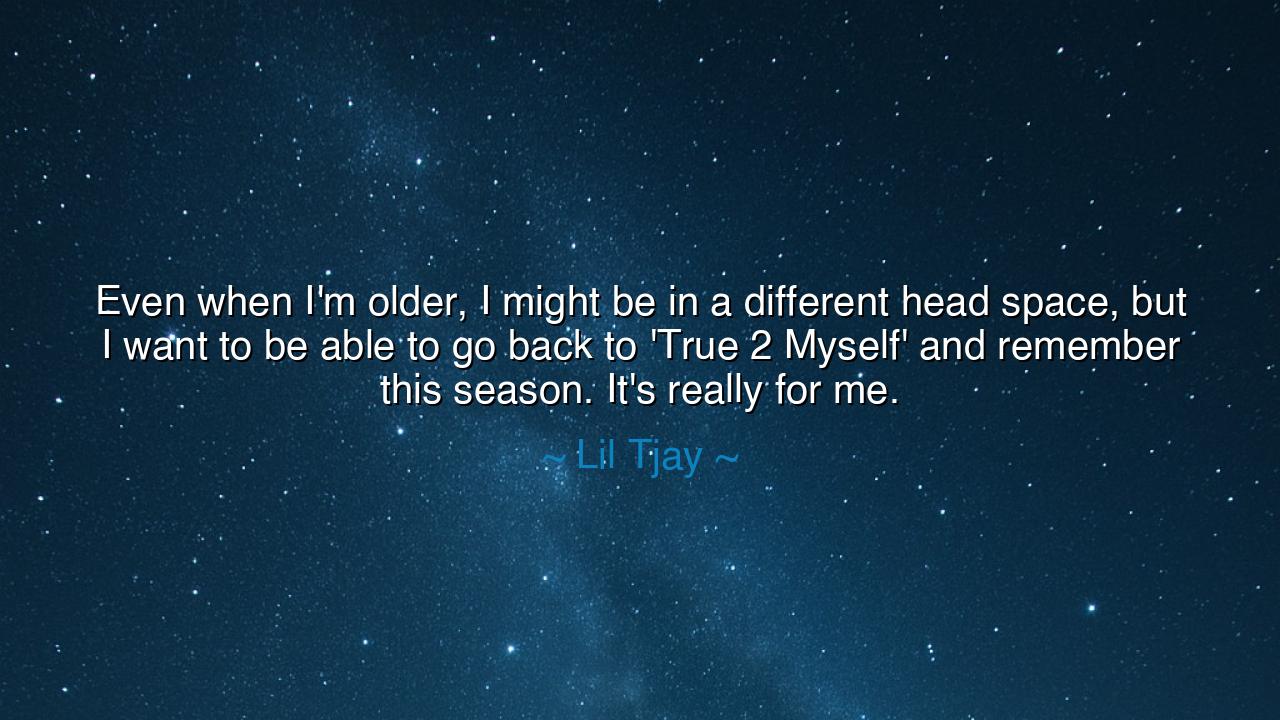
Even when I'm older, I might be in a different head space, but I
Even when I'm older, I might be in a different head space, but I want to be able to go back to 'True 2 Myself' and remember this season. It's really for me.






In the grand tapestry of life, where each season of our existence carries its own weight, Lil Tjay’s words strike at the heart of what it means to reflect and remain true to oneself: "Even when I'm older, I might be in a different head space, but I want to be able to go back to 'True 2 Myself' and remember this season. It's really for me." These words speak to the power of self-awareness, of remembering who we are in moments of clarity and youthful energy, and the importance of preserving those memories for the future. Tjay recognizes that life is full of changes—the head space we occupy today may not be the same as the one we hold in the future—but the essence of who we are in this moment is something worth holding onto.
The ancients also knew the value of memory and self-reflection. In the Greek tradition, Plato spoke often of the importance of self-examination and the need to remember one’s true self. In his Apology, Socrates declares, "The unexamined life is not worth living," urging his listeners to reflect on their lives, their actions, and the essence of their character. For the ancients, the process of looking back—of remembering who you were and who you sought to become—was central to understanding the present and making decisions about the future. Tjay, in much the same way, speaks to the need to anchor oneself in a foundation of authenticity, a reminder that even when the winds of life change, there is value in returning to the core truths of who we were at our best.
Tjay’s desire to return to his "True 2 Myself" in a different head space is a profound statement about the fluidity of human experience. It acknowledges that our thoughts, emotions, and perspectives evolve over time, as we move through different seasons of life. In youth, we are filled with vibrance, with dreams and a sense of purpose that feels clear and unwavering. Yet, as time passes, we may face challenges that alter our view of the world, or perhaps circumstances will lead us to adapt to a new reality. This journey, however, should not erase who we were or what we stood for. Just as the great warriors of old, like Alexander the Great, would carry the memory of their victories and losses through the rest of their lives, we too must learn to preserve the essence of our past selves, remembering the integrity and values we upheld in our best moments.
Consider the story of Marcus Aurelius, the philosopher-king of Rome. In his Meditations, Aurelius, though the most powerful man in the world, reflected deeply on his inner life. He sought to maintain a connection to his truest self amidst the turbulent life of a ruler. Even in the face of war, political strife, and personal loss, he would write down thoughts that anchored him to his virtue, reminding himself of the values he sought to live by. For Aurelius, his writings were a way to preserve his internal world—his reflections on wisdom, justice, and temperance—so that even in future seasons of his life, he could return to these moments of clarity. This practice of remembering, of writing down his true thoughts, mirrors Tjay’s desire to go back to his “True 2 Myself” and remember who he was in the present.
Tjay’s quote also highlights the ephemeral nature of youth and the passage of time. Like the ancient Greek philosophers, he acknowledges that the head space we occupy today is not fixed; it shifts and changes as we move through life. This understanding is not one of despair, but of acceptance. The knowledge that we are ever-changing should not diminish the value of our current self. Instead, it should be an invitation to embrace our experiences, to collect memories and insights that will serve as guides in future seasons. Just as the ancients revered the wisdom that came with age, we too must recognize the value in preserving our authentic selves for the future.
Thus, the lesson that Tjay imparts to us is a powerful one: that in the rush of life’s ever-shifting seasons, it is vital to remember who we are at our core. In times of clarity, we must anchor ourselves to the values that are most true to our spirit, so that when we face moments of change or challenge, we can return to them and find our way. This is not a call to resist growth or transformation, but to honor the essence of who we are and what we stand for in the process. As we move through the seasons of our lives, we must not forget the importance of holding on to the authentic parts of ourselves that make us who we truly are.
Let us then, like Tjay, commit to the practice of remembering. Let us reflect on who we are now and preserve our truths, not as a way to freeze time, but as a way to stay connected to the essence of our lives, to always return to the foundation of our being when we need it most. Whether we write it down, speak it aloud, or simply keep it within, the power of remembering who we are in this moment is the key to navigating the ever-changing seasons of life. May we find strength and wisdom in this simple but profound truth: to truly live is to remain true to ourselves, in all the seasons of our lives.






AAdministratorAdministrator
Welcome, honored guests. Please leave a comment, we will respond soon